Introduction
Companies currently working in the digital age, where their online reputation can either make or break success. With the rise of online reviews, social media, and search engines, consumers rely on making a proper decision. Due to this, Online reputation management (ORM) has become essential. ORM refers to shaping, maintaining, and perfecting the online perception regarding your brand, which therefore affects people’s ability to trust or stick with you.
In this blog, we will explore what online reputation management is, why it is important, and the best practices involved in creating a good, positive online image
What is Online Reputation Management?
Online reputation management is the process of monitoring as well as influencing public opinion. Regarding your business or establishment on the internet. It encompasses reviews, social media interactions, blog inclusions, and likes. Online reputation management involves feedback, dealing with complaints, and promoting content with positive messages that reflect well on your brand.
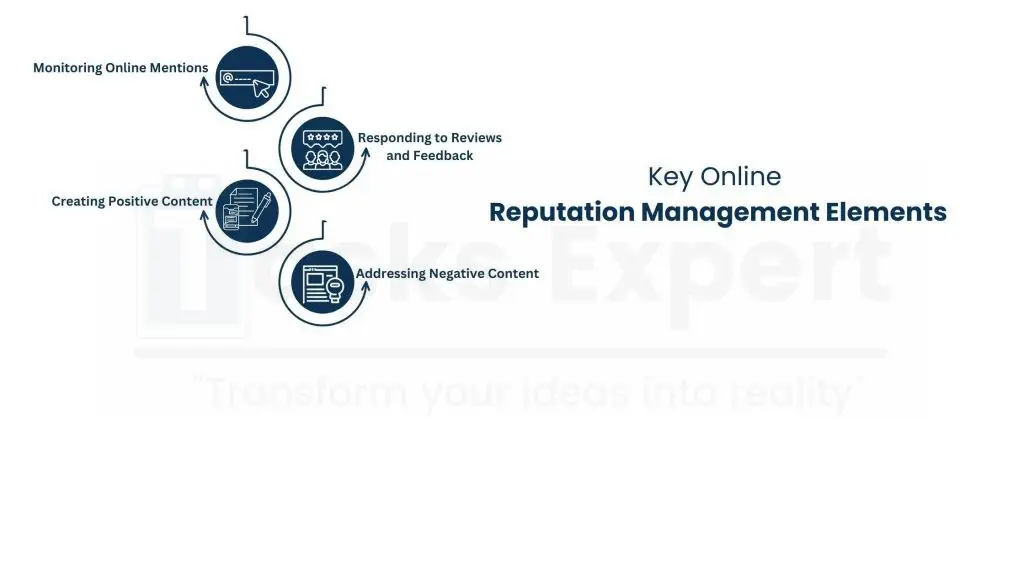
Key online reputation management elements:
- Monitoring Online Mentions: Monitor for brand mentions on review sites, social media, and search.
- Responding to Reviews and Feedback: Engaging and dealing with both positive and negative reviews on the sites, in blogs, on social media, and on feedback.
- Creating Positive Content: Creating positive content to market your brand through testimonials, case studies, and success stories.
- Addressing Negative Content: Proactively address the negative comments to help reduce the impact on your brand with negative reviews or comments.
A strong ORM strategy enables businesses to maintain a positive online image, build trust, and maintain loyal customers
Importance of Online Reputation Management
An online reputation has become the first impression many customers will have of a business. Now, studies present that over 90% of all consumers read and research online reviews before making any purchases, so a bad online image can indeed deter potential customers.
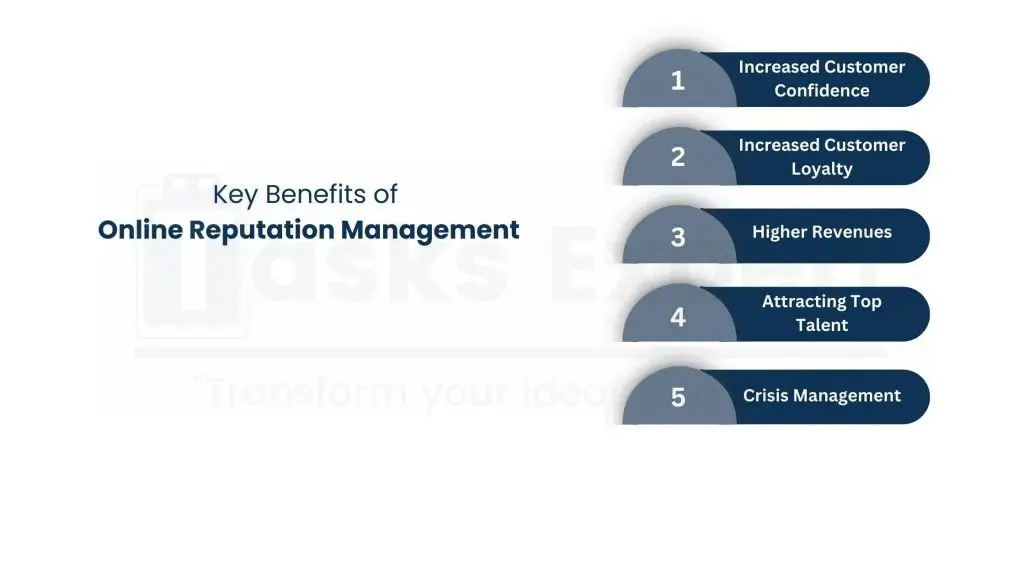
Key benefits of online reputation management:
- Increased Customer Confidence: An excellent online reputation allows customers to easily decide on your brand over others.
- Increased Customer Loyalty: You are able to prove to the customers that their views will be considered. And you are engaged with them, hence this builds loyalty for the long run.
- Higher Revenues: Positive reviews and recommendations help increase conversions and sales.
- Attracting Top Talent: To say honestly, great talent also researches companies before even applying; a good reputation will attract all needed skilled professionals.
- Crisis Management: ORM assists businesses in mitigating and easing any negative situation before it gets out of hand.
Online reputation management does not only create healthy customer relationships but also protects your business from possible tatters when there is adverse coverage.
Also Read: Virtual Assistant Services in Eastside
Important Strategies for Effective Online Reputation Management
It involves efficiently managing your online reputation since control and oversight of a brand reputation can be overwhelming. Utilize the following strategies to monitor and maintain a clean reputation online.
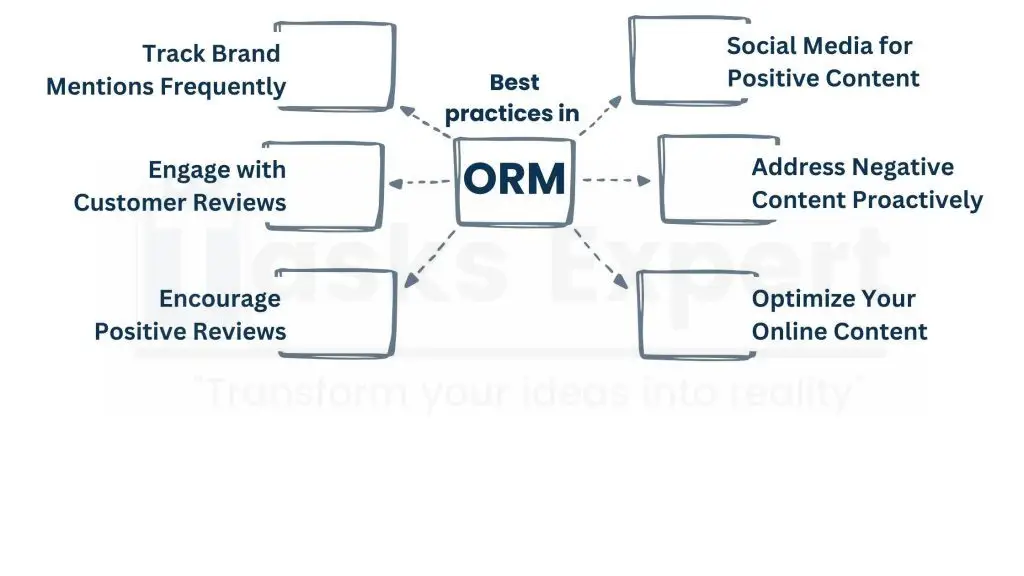
Best practices in ORM:
Track Brand Mentions Frequently:
- Description: Use Google Alerts, Mention, or Brandwatch to monitor whether your business, products, or services are being discussed.
- Benefits: Monitoring lets you keep up with what is being said about your brand and respond immediately if the situation warrants it.
- Tips: Set up alerts on the brand name, product name, and common misspellings for full coverage.
Engage with Customer Reviews:
- Description: The positive and negative reviews attract appreciation for customer comments.
- Benefits: engagement establishes trust and provides a sense of commitment to improve customer experience.
- Tips: be thankful to customers who reviewed your service and product positively and respond to the wrong things done within the service in the negative reviews professionally and sympathetic.
Encourage Positive Reviews:
- Description: positive reviews increase credibility and change the attitude of potential customers about your business.
- Benefits: several positive reviews can win out some of the adverse comments sometimes and raise your rating altogether.
- Tips: Get happy customers to post their experience on review sites such as Google, Yelp, and Trustpilot while providing them with direct links to do so.
Social Media for Positive Content:
- Description:Share the experiences and success stories of your clients or customers along with any other users’ generated content on social media
- Benefits:Influence public opinions and set the number of potential followers.
- Tips:Regularly enter their sites and engage followers by liking and sharing positive mentions and commenting on those.
Address Negative Content Proactively:
- Description: Respond quickly, politely, and in solution-focused ways to complaints or negative postings.
- Benefits: Responses that are prompt can also sometimes prevent a bad review from spreading and, to the benefit of other customers, show that you do care.
- Tips:Whenever possible, take issues up with customers directly and then follow up to make sure that all is well.
Optimize Your Online Content:
- Description: Update your website and social media with good content regularly, blogs, news, and success stories.
- Benefits: Good content makes your brand more visible and repositions you as the authority in your niche.
- Tips: Content creation should align with your brand values; most questions or concerns customers might have are already answered.
Through such measures, a business is bound to develop an online presence that will become respectable and attract customers while deepening relationships with existing ones.
Best Tools for Effective Online Reputation Management
Managing your brand’s reputation is quite a time-consuming affair. However, many tools would ease the procedure by automating monitoring, reporting, and analysis.
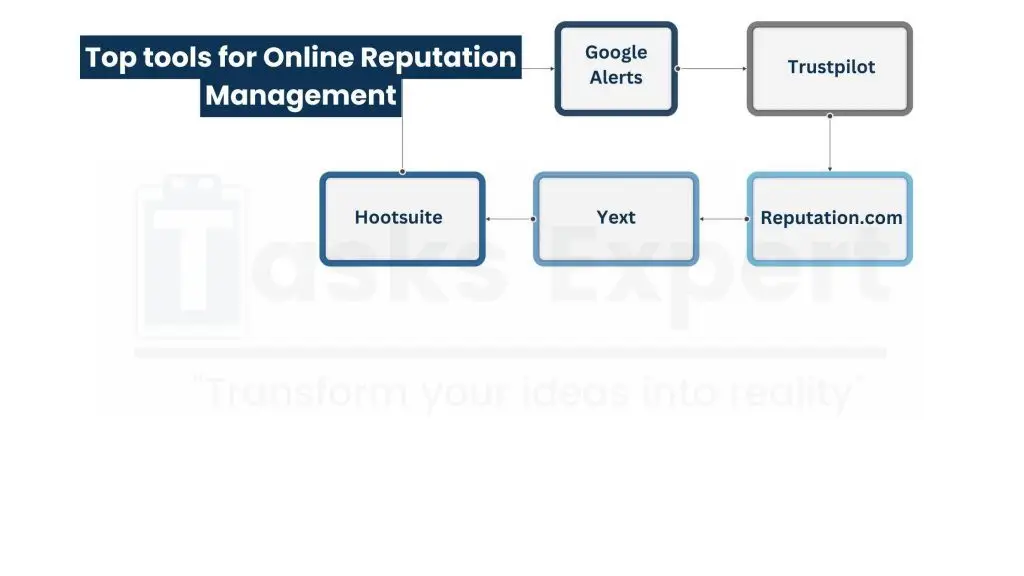
Top tools for online reputation management:
- Google Alerts: Tracks online mentions of your brand, products, or competitors
- Trustpilot: A review management platform that helps gather, respond to, and promote customer reviews.
- Hootsuite: A social media management tool that helps track mentions of your brand and responds to comments in real-time.
- Yext: Manages online listings to help the same information flow consistently and accurately about your business across those platforms.
- Reputation.com: Provides insights into your online reputation, brand sentiment, and customer feedback trends. You can, therefore, use these tools to monitor your online reputation, respond on time, and change a customer’s perception and trust.
How Online Reputation Management Impacts SEO
A company’s online reputation also impacts its ranking of a company. Search engines will consider and favor brands with a good reputation; therefore, reviews mentions on social media, or general sentiment towards a brand impact SEO.
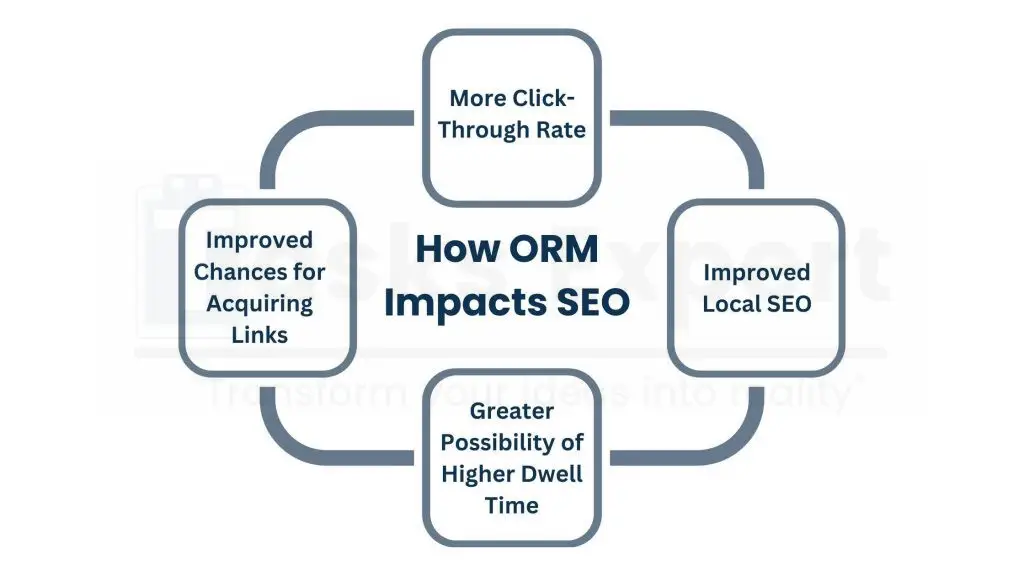
How ORM Impacts SEO:
- More Click-Through Rate: Positive reviews and an enhanced online reputation will lead to more clicks, which notifies the search engine that your brand is worth consideration.
- Improved Local SEO: Engagements and reviews on Google My Business may have a direct impact on how you rank on local searches.
- Greater Possibility of Higher Dwell Time: Positive content and a friendly website user experience often lead to dwell time, which can be used to manipulate ranking.
- Improve: A company’s online reputation also impacts its ranking of a company. Search engines will consider and favor brands with a good reputation; therefore, reviews mentions on social media, or general sentiment towards a brand impact SEO.
- Improved Chances for Acquiring Links: Reputation is a great predictor for link formation from good sites. Readers are bound to visit other sites carrying an honest opinion about an organization, thereby enhancing the SEO authority of that organization.
Managing your reputation online builds not only trust but also the visibility and ranking of your website, so it may increase the chances of new customers.
How to Keep up Online Reputation: Common Mistakes and How to Avoid Them
ORM can be incredibly beneficial, but some common mistakes can easily counter your efforts. Examples of common ORM mistakes give you some very important advice on how to avoid them and ensure that your ORM strategy remains effective and beneficial for your brand.
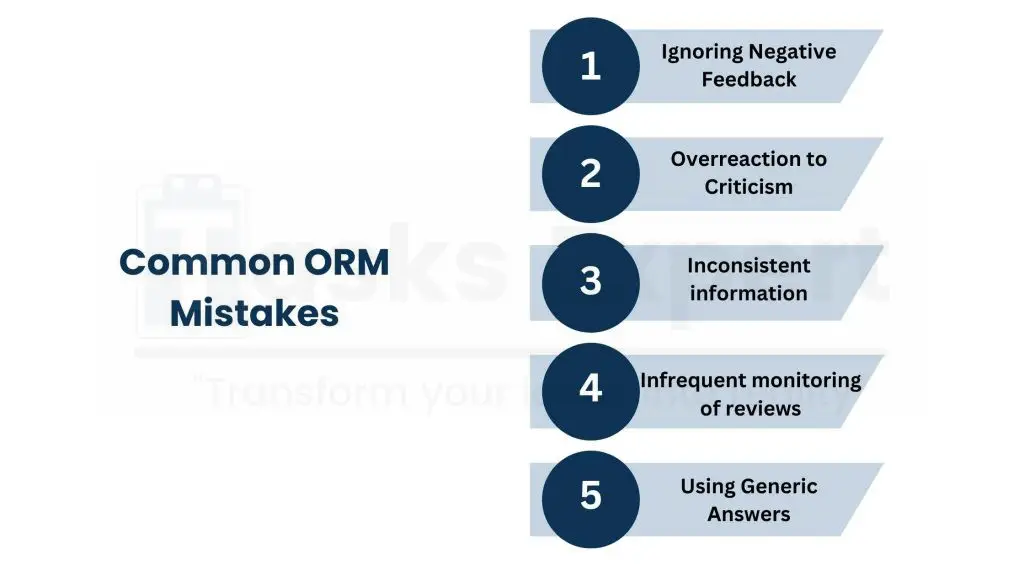
Common ORM mistakes:
- Ignoring Negative Feedback: Failure to respond to negative criticism or bad reviews will make your business appear unresponsive to problems. Always address feedback professionally
- Overreaction to Criticism: One does not have to be emotional in responding to criticism. An answer should be polite and constructive.
- Inconsistent information: Business information disseminated on all online directories must be uniform to avoid a misunderstanding regarding the business.
- Infrequent monitoring of reviews: Reviewing can overlook some issues that may become aired over time, and lose even one relationship opportunity, which you would otherwise have caught and worked out.
- Using Generic Answers: Refrain from using the copy-and-paste method of response reviewing. They make customers feel special and also give a brand bump in credibility.
By avoiding such mistakes, companies can ensure that all their online reputation management activities do not defeat the very cause for which they were conducted which is to enhance brand image.
Conclusion
Building trust, or attracting new customers, fosters loyalty, and today is all about online reputation management. A company can now engage in appropriate ORM through monitoring of online mentions and response to feedback that can help in producing content of positive value so that negative situations if they ever arise, may be tackled ahead of time. Effective ORM equips businesses with a positive image, increases their visibility, and enables long-term relationships with customers.
Whether a beginner in ORM or a person interested in enhancing the strategy, investing in online reputation management is a crucial step toward long-term business success. An excellent reputation will attract clients and sustain growth, helping the business thrive in a very competitive marketplace.
About Us
Tasks Expert offers top-tier virtual assistant services from highly skilled professionals based in India. Our VAs handle a wide range of tasks, from part time personal assistant to specialized services like remote it support services, professional bookkeeping service etc. Furthermore, it helps businesses worldwide streamline operations and boost productivity.
Ready to elevate your business? Book a Call and let Tasks Expert take care of the rest.









